FY 2023 Highlights
Building on the momentum launched by Texas voters 16 years ago and reauthorized by a decisive statewide vote in November 2019, CPRIT and its grantees have advanced innovative research and prevention efforts throughout the state. The year 2023 saw numerous milestones and significant accomplishments for CPRIT and our grantees, but as always, the beginning and end of our work at CPRIT rests in our grant awards.
In September 2023, the newly formed Advanced Research Projects Agency for Health (ARPA-H) competitively selected Texas to serve as one of its three regional hubs for ARPANET-H, a nationwide health innovation network. The ARPANET-H Customer Experience hub is headquartered in Dallas at Pegasus Park.
CPRIT achieved an important milestone in 2023 having awarded its 300th CPRIT Scholar recruitment grant. As of August 31, 2023, CPRIT has invested $865.6 million to recruit 302 CPRIT Scholars to 20 universities and research institutions across the state, adding the equivalent of 8,000+ years of productive research to Texas.
In 2023, a Texan became the 400,000th person to receive their first cancer screening through a CPRIT-funded project. As of August 31, 2023, CPRIT-funded screening projects have detected more than 39,000 cancers and cancer precursors and helped to navigate patients to treatment.
CPRIT released the Texas Resource Guide (www.texasresourceguide.org) in 2023 to help innovators operate in Texas. This online database provides information and resources about service providers and other entities – including potential sources of investment – that support early stage and developing life science companies wanting to start, expand, or relocate operations in Texas.
CPRIT Sponsored Computational Oncology Symposium UT Austin
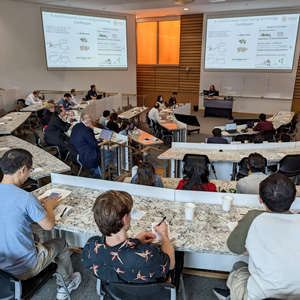
CPRIT co-sponsored the first “Expanding Texas Leadership in Computational Oncology Throughout the Cancer Continuum” symposium held April 20, 2023, at The University of Texas at Austin Dell Medical School. Symposium co-sponsors included The University of Texas MD Anderson Cancer Center, the Livestrong Cancer Institutes, and the Oden Institute for Computational Engineering and Sciences at UT Austin. More than 160 established researchers, post-doctoral fellows and doctoral students attended the symposium in person and online.
Symposium topics included the use of artificial intelligence in clinical practice, deep machine learning, genomics, immunotherapy, and microRNA therapy. In addition to opportunities for networking and developing collaborations, the symposium featured research presentations from leading investigators at Texas institutions, including five CPRIT grantees and two CPRIT Scholars. Breakout working groups identified leading-edge research opportunities with a focus on opportunities that are unique to Texas, as well as resources, research expertise, and infrastructure needed to further elevate Texas’ preeminence in this field.
Cancer is a complex multi-scale disease involving the interaction of dynamic processes at the molecular, cellular, and multicellular levels. Computational oncology employs multidimensional data, mathematical modeling and advanced computing to develop models and simulations that help scientists understand complexities in physical/natural systems. With the insight into cancer biology provided through computational oncology, researchers can better predict integrated mechanisms underlying cancer initiation, progression, metastasis, prognosis, and treatment response.
SMU Recruits First CPRIT Scholar
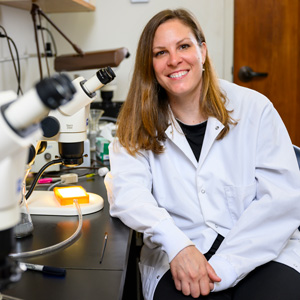
Southern Methodist University recruited its first CPRIT Scholar, Annika Wylie, Ph.D., for the position of assistant professor in the Department of Biological Sciences, with the support of a $2 million CPRIT First-Time, Tenure-Track Faculty Members grant (RR230081). Dr. Wylie is performing groundbreaking research into the tumor suppressor p53 gene, which mutates in at least half of all human cancers. Through her identification of novel regulatory effects of p53, Dr. Wylie made significant contributions to the understanding of cancer biology.
Dr. Wylie’s research will continue to lay the groundwork for innovative investigations into the functions of distinct TP53 isoforms and the identification of new therapeutic targets, such as retrotransposons. The results will provide insights into the therapeutic efficacy of newly developed TP53 inhibitors based on a tumor’s isoform expression profile.
The University of Texas Rio Grande Valley School of Medicine Receives First Texas Research Excellence in Cancer (TREC) Award in the Region
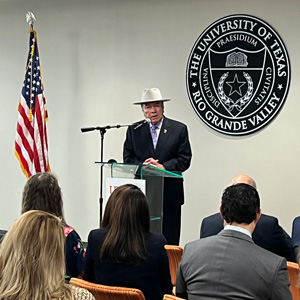
In February 2023 CPRIT awarded The University of Texas Rio Grande Valley School of Medicine the region’s first Texas Research Excellence in Cancer (TREC) award to create the South Texas Center of Excellence for Cancer Research (ST-CECR). With the support of $6 million in CPRIT funding, the ST-CECR, under the leadership of founding director Subhash Chauhan, Ph.D., is taking a comprehensive approach to reducing cancer health disparities in the region. The award supports four investigator-led research projects on different aspects of hepato-GI cancers, recruitment of three new cancer researchers, and the establishment of a Biospecimen and Tumor Biology Core Resource facility.
CPRIT created the TREC award in 2022 as a multicomponent grant designed to strengthen the cancer research environment and to increase the number and quality of scientifically meritorious cancer research projects at institutions located in regions of Texas that have historically received low levels of peer-reviewed cancer research funding. A high priority is developing research programs addressing cancer challenges specifically affecting regions of Texas without a National Cancer Institute-designated cancer center.
CPRIT CEO Receives THBI Luminary Award
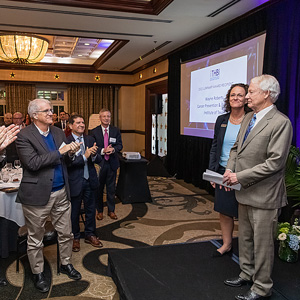
At its annual Fall Policy Summit held at the Stephen F. Austin Hotel on October 25, 2023, the Texas Healthcare and Bioscience Institute (THBI) recognized CPRIT Chief Executive Officer Wayne Roberts with its highest honor, the Luminary Award. THBI is the policy voice for the Texas healthcare and bioscience industry, positioning the state as a leader in biotechnology and life sciences.
Each year, THBI’s membership nominates individuals who have had an impact on the life science and biotech community through policy, advocacy, and research. THBI recognized Mr. Roberts for his work and dedication to fostering innovations for potential medical breakthroughs in prevention and cures, and championing cancer research in Texas.
“I am humbled to receive this award,” said Mr. Roberts, “because I know it is in recognition of the success of CPRIT and our grantees, grantee institutions, prevention programs and corporate innovators throughout the years. CPRIT is the spark that ignited a life science and biotech revolution in Texas, and I am proud to have played a role in that success.”
CPRIT Scholar Todd Aguilera Named to Inaugural Cohort of Cancer Moonshot Scholars

On August 3, 2023, the National Cancer Institute (NCI) and the Biden Cancer Moonshot named CPRIT Scholar Todd Aguilera, M.D., Ph.D., as one of the first Cancer Moonshot Scholars. The Cancer Moonshot Scholar program supports early-career researchers.
As an inaugural Cancer Moonshot Scholar, Dr. Aguilera, assistant professor in the Department of Radiation Oncology at The University of Texas Southwestern Medical Center, will receive $3.3 million from the NCI over five years to fund research seeking new treatments for rectal cancer. This form of cancer is increasingly affecting young people and those from diverse backgrounds who may have limited access to health care and cancer screenings.
UT Southwestern recruited Dr. Aguilera from Stanford University in 2017 with the support of a $2 million CPRIT Recruitment of First-Time, Tenure-Track Faculty Members grant (RR170051). Dr. Aguilera’s expertise is in molecular engineering, molecular imaging, and tumor immunology.
CPRIT Awards First Texas CONNECT for Cancer Prevention Study Grant
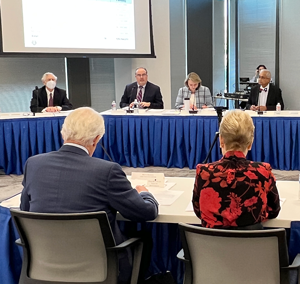
In August, CPRIT approved a $7.5 million grant to Baylor Research Institute in Dallas (RP230426) for the Texas CONNECT for Cancer Prevention Study that creates a statewide cohort within the NCI Connect study. This is the first time CPRIT has offered this grant, which will fund work across urban, rural, low-income, and minority populations in 46 Texas counties to collect biological, environmental, behavioral, and demographic information.
By agreeing to share their information with the Texas CONNECT study, 25,000 Baylor Scott and White Health patients will offer a wide variety of information over the long term through surveys, physical measurements, bio-samples, etc., which will help researchers understand health and behavior patterns that affect cancer risk.
More than 660 people attended the CPRIT Innovations VI Conference in Galveston on October 2-3, 2023. Sixty speakers and moderators from across the cancer research and prevention field underscored the exceptional progress at medical and academic research centers, in communities, and at companies throughout Texas.
The program began with a keynote address by Douglas Lowy, M.D., chief, Laboratory of Cellular Oncology at the National Cancer Institute (NCI). Dr. Lowy addressed the NCI’s vision for the nation’s cancer care, research enterprise, and priorities for the prevention of HPV-associated cancers. Additional national speakers included John Carpten, Ph.D., CEO, City of Hope, (“Accelerating Innovation in Cancer Population and Genomic Sciences”), Katy Keenan, Ph.D., the National Institute of Standards and Technology, (“Innovations in Cancer Screening”), and Stephen Baylin, M.D., professor and co-director, Cancer Biology Division at Johns Hopkins, (“Epigenome and Cancer: From Biology to Therapy”). The conference also included a company showcase highlighting CPRIT’s investments in product research and development and a Town Hall discussion regarding the 2024 redraft of the Texas Cancer Plan.
In addition to 325 poster presentations by conference participants featuring the latest innovations in the fight against cancer, there were informative sessions on CPRIT-funded initiatives on computational biology and modeling for drug discovery, the use of artificial intelligence in imaging, the expansion of drug development resources and biomanufacturing facilities in Texas, and immunology and vaccine development in cancer. Lively CPRIT grantee networking sessions on multiple cancer prevention topics, including HPV vaccination and colorectal cancer screening, were also available to attendees.
A highlight of the two-day conference was the gala dinner and presentation of the inaugural “Texans Conquer Cancer” awards, which recognize individuals or organizations that have demonstrated outstanding leadership in furthering CPRIT’s mission to prevent, detect, treat, and cure cancer in Texas. CPRIT CEO Wayne Roberts presented the awards to four Texas legislators who were instrumental in the creation of CPRIT in 2007 and its reauthorization in 2019: Secretary of State and former state senator Jane Nelson, former state representative Jim Keffer, former state representative Dr. John Zerwas, and current Austin Mayor and former state senator Kirk Watson.
CPRIT strives to generate the greatest possible benefit for Texans when awarding grants. The agency supports academic research, product development, and prevention projects that show great scientific promise, meet critical needs, and advance the state’s life science ecosystem. CPRIT’s investments help grantees build novel facilities, achieve scientific breakthroughs, reach clinical milestones, and detect cancers and cancer precursors earlier.
Over the last 14 years, CPRIT has invested $3.38 billion in Texas’ universities, enterprises, and organizations. CPRIT supports the cancer continuum from discovery to delivery, awarding more than 1,901 grants to academic research, product development, and prevention projects across Texas through August 31, 2023.
CPRIT’s $3.38 billion investment in 1,901 of the best ideas in cancer research, product development, and prevention enhances Texas’ role in the global fight against cancer. A snapshot of some notable research findings reported in fiscal year 2023, as well as other important milestones, awards and prestigious appointments, and prevention outreach, are shown below. Click on "View or Download All" to see the information reported for the fiscal year.